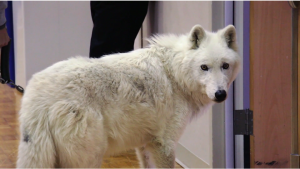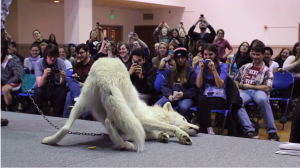Student Film Premieres at Woodstock Film Festival
Five digital media production students filmed a compelling documentary about a traveling ambassador wolf named Atka for a class project last spring. Their film, “Waning Wolf,” has received industry recognition, premiering as an Official Selection of the Woodstock Film Festival at two venues on Oct. 17 and 18.
Ian Todaro and Sasha Ribowsky had not met before taking Assistant Professor Gregory Bray’s Digital Filmmaking course, but both shared a passion for wolves. Ribowsky volunteered at the Wolf Conservation Center (WCC) in South Salem, NY, while in high school, eating her lunches outside of Atka’s enclosure. Todaro counts the children’s book, The First Dog, about a cave boy who befriends a wolf, among the formative reading experiences of his childhood.
When asked to post documentary ideas to a class discussion board, both submitted ideas for a wolf documentary within minutes of one another, and a natural filmmaking alliance was born.

Together with fellow students Juliana Hedeman, Ryan D’Angelo-Sylvia and Victoria Ottomanelli (all 2014 digital media production graduates), Todaro and Ribowsky set out to tell a true story about wolves in the wild and the essential role they play in maintaining a healthy ecosystem.
Ribowky served as executive producer and sound designer of the film, and Todaro assumed director duties. Both shared screenwriting credits, and their classmates assisted with producing and editing the film.

Ribowsky described wolves as “keystone predators” that hunt species that would otherwise ravage forest vegetation. The absence of wolves in the wild, said Ribowsky, has a “trickle-down effect.” Because wolves no longer exist in their native environment in the Hudson Valley, the deer population has exploded. By feeding off of the leaves and bark of young trees, the unchecked deer population has destroyed the habitats of nesting birds, insects, flowers, squirrels and raccoons.
“Species will leave because there isn’t enough bounty,” said Ribowsky.
The 17-minute documentary dispels the myth of wolves as the “big, bad” predators of fairy tales like Little Red Riding Hood and the Three Little Pigs. “They’re really not as confrontational and evil as we paint them,” said Ribowski, noting that the popular fables stemmed from famers’ anxiety over wolves attacking their livestock.
“When people hunt wolves, they are actually more likely to go after livestock than to leave them alone,” said Ribowski, noting that in nature, wolves attack sickly and weak deer, and “help shape and evolve the species.” When hunters kill the alpha wolf, it weakens the pack. Wolves are forced to find easier prey, such as livestock.
The filmmakers interspersed footage of Atka with interviews by WCC staff members and experts on wolf behavior. Founded in 1999, the WCC offers numerous educational programs aimed at teaching people about wolves and their relationship to the environment. Twelve-year-old Atka is the center’s most prominent traveling ambassador, and frequently visits schools, nature centers, museums and libraries.
Ribowsky and Hedeman were instrumental in bringing Atka to New Paltz in April for a presentation in the Student Union, which they filmed for the documentary. Todaro testified to Atka’s ability to provide a compelling face to the plight of wolves.
“Immediately, when he came out, the tone of the room changed. People immediately perked up and were taking notice and paying attention,” he said.
The digital filmmaking course is a capstone course required of all digital media production majors. Though she hoped to do well in the class, Ribowsky, who graduated in the spring with dual degrees in digital media production and French, said the experience of making the film “was never about getting a good grade.”

“It was about making something that would make a difference and be gratifying,” she said.
Screening at Woodstock represents a major coup for the young filmmakers. “There are a lot of professionals who are showing things there, and it’s really exciting to be among them,” said Ribowsky. “It’s humbling because I’m still at the beginning of my career, and I still have a lot to learn.”
Todaro, now in his fourth year in digital media production, volunteered at the film festival last year and worked at the Woodstock Comedy Festival last month. “Now I’m there as a filmmaker. It’s really cool,” he said.
The film’s world premiere at Woodstock comes after wins at the 2014 Eli Jaffee Film Competition and numerous international festivals. Todaro used Film Freeway, an online festival submission platform, to enter the film in competitions in Belgium, Russia, Estonia and Bulgaria.
As they contemplate their futures as filmmakers, Ribowsky and Todaro hope to continue sharing the environmentalist message at the heart of “Waning Wolf.”
Ribowsky, who is currently doing freelance video editing work, hopes to transition into a career making documentaries on environmental topics. She’s interested in tackling such topics as clean water sustainability and genetically modified foods.
Todaro, who is a work study student in the digital media equipment room, is exploring spring internships at the Daily Show, Colbert Report, Animal Planet and National Geographic. Creating films that combine his interests in wildlife and comedy is a long-term goal.
“If dogs could tell stand-up, that would be living the dream,” he said.
